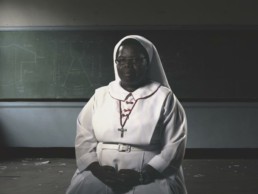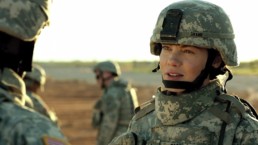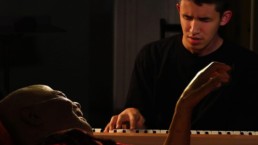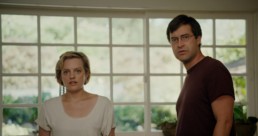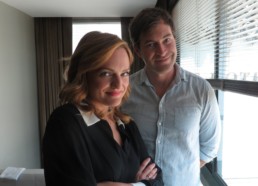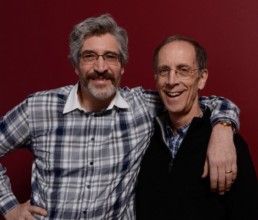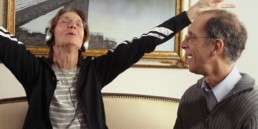Review: 'Sewing Hope'
This gem of a movie appeared in my inbox last week while I was going through emails, and immediately I was fascinated by the woman in the picture. Her stoic face, the dreamlike quality of the color grade, and the title alone, Sewing Hope, piqued my interest. I quickly discovered that Sewing Hope recently made its festival run and doesn't have a set theatrical release date (although you can stream the documentary online, which is now available to watch). While we typically don't cover films outside of theaters, it's our mission to cover independent films, and if there was ever a socially relevant, emotionally moving film worth watching, it's Sewing Hope.
Sister Rosemary Nyirumbe is the woman in the picture and the subject of the documentary. Narrated by Academy Award winner Forest Whitaker, Sewing Hope centers around the women and children affected by Joseph Kony and the Lord's Resistance Army in Northern Uganda, and how Sister Rosemary gave these girls a second chance at life using just a sewing machine and soda can pop tabs.
"The guns have stopped firing, but the war still remains"
Recalling harrowing stories from child brides and rebels, these girls finally feel comfortable enough to share their story around Sister Rosemary. Ashamed, one admits she was forced to kill her younger sister by "cutting her up into little pieces," while another remembers the rebels putting padlocks through the lips of those who spoke out of turn. Its graphic nature is shown by animation throughout the film. Many girls admit that they will never be able to forgive themselves, and to this Sister Rosemary preaches hope- hope for today gives hope towards the future.
"The guns have stopped firing, but the war still remains," Sister Rosemary exclaims, as she introduces these girls to life skills that will help them reintegrate into society. Forever branded a "rebel" by their communities, many girls find solace at St. Monica Girl's School- the institution Sister Rosemary set up to rehabilitate and educate children.
These are powerful women; their faces show signs of heartache and sadness, but they persevere for the hope of a better life. Aside from the clothing and baked goods they make (and are subsequently sold throughout the community), Sister Rosemary has given the girls the skills needed to create handbags. They create beautiful purses made out of thread and pop tabs, which retail in the United States for around $300. The girls get paid per bag made- giving them the opportunity to decide how much money they make, but most importantly, they are instilled with a strong work ethic that will last a lifetime.
Sewing Hope is a platform to draw attention to these girls and their stories. Sister Rosemary is a fantastic subject; She became a nun at 15, stood up to Kony and the rebels, and continues to empower girls by teaching tough love, and giving them the confidence to be independent and self-sufficient. Essentially, she is giving them a future- or at the very least, giving these girls hope for a better future. Sewing Hope runs less than an hour and can be seen here: http://www.snagfilms.com/films/title/sewing_hope
https://www.youtube.com/watch?v=hUbGD6waqvs
Review: 'Fort Bliss'
If you're expecting an action-packed, high-intensity war drama, I can tell you right now, you'll want to skip Fort Bliss. However, if you're into "Lifetime Movie Network" type films about strong, independent women who struggle yet ultimately persevere, then maybe Fort Bliss is your type of movie. Maybe.
This isn't a movie about war- rather, it's about life after war. Specifically, about one woman's struggle to reintegrate herself into her son's life after returning home from overseas. Michelle Monaghan (True Detective) carries the film as Army medic Maggie Swann, who, after returning from a two-year tour in Afghanistan, discovers that the life she knew has drastically changed. Her ex-husband Richard (Ron Livingston) is now engaged to another woman, Alma (Emmanuelle Chriqui), and her six-year-old son Paul (Oakes Fegley) doesn't remember who she is.
Understandably, Maggie's confidence as a mother would be shaken given her devastating circumstance, but she never seems to come out of playing that distant mother.
Much of the film focuses on Swann's struggle to accept her new, post-war life. At one point, she has an intimate moment with her son, asking if they can start their relationship over. She playfully introduces herself ("Hi, I'm Maggie,") and shakes his little hand. This is the first major milestone in their rocky relationship. However, for all of the emotional moments that the movie tackles, there are equal amounts of lackluster ones.
Despite its positive message, I ultimately have a hard time believing Maggie's struggles. Monaghan plays the part of an Army servicewoman with conviction, but she seems to lack any and all maternal instincts upon her return from war to an unrealistic degree. Understandably, her confidence as a mother would be shaken given her devastating circumstances, but she never seems to come out of playing that distant mother. The script lacks the precise authenticity needed to give this film its staying power. It's unclear if the screenwriter (who also happens to be the director, Claudia Myers) had help from real Army veterans, but I'd bet that if she would have, the dialogue would not have been as lackluster. But perhaps that is the fault of the director. It's obvious that Myers has a personal interest in women in the military, and her casting choices for the film were great, although it lacks the substance to be a memorable war film and drama.
https://www.youtube.com/watch?v=kWLtr0xYI7E
Review: 'Keep On Keepin' On'
His music has been described as "happy jazz," and for those who know of the legendary trumpeter Clark Terry, "happy" seems like an under-sell. How about invigorating? Vibrant? Perfection? As one of America's most amorphous and celebrated genres of music, Clark Terry brings a whole new level of appreciation to the art of Jazz, which is beautifully captured in the documentary, Keep On Keepin' On. Even at 93 years young, Terry proves that no matter what life challenges come one's way, there's always peace in music.
Keepin' On not only profiles Clark but also his friendship with 23-year-old Justin Kauflin who, like Terry, is an extremely gifted musician. Kauflin is a piano prodigy, whose beautiful music is made all the more extraordinary after we discover that he is blind, and suffers from extreme stage fright.
Their perseverance is heavily coated throughout the film, one of my favorite subtleties being Justin's ringtone- Bobby McFerrin's "Don't Worry, Be Happy."
Both of their lives are full of challenges, although much to my delight, the audience is never made to feel sorry for the duo- we never feel as if they are suffering, even when going through some unimaginable hardships. They are not portrayed as victims; rather, they are pioneers for artists with disabilities. Their perseverance is heavily coated throughout the film, one of my favorite subtleties being Justin's ringtone- Bobby McFerrin's "Don't Worry, Be Happy."
The film does an excellent job of balancing the past with the present. Born in the 1920's, Clark Terry lived during the Golden Era of American Jazz and reflecting on its history is extremely interesting. For any music aficionado, watching old footage of Clark mentoring a young Miles Davis brings a smile to your face. It's obvious that even from a young age, Terry's joy came from helping other young musicians find their sound, and that is exactly what he continues to do today with Justin.
Aside from the gem of the story, the creative team behind Keepin' On is another reason for its successful outcome. The film was produced by Quincy Jones (a former Clark Terry student) and Paula DuPré Pesmen, whose previous films include the Academy Award-winning documentary, The Cove. In an interesting and humbling turn, Director Alan Hicks is not only a fan but a former student of Clarks'. As a drummer in Clark Terry's ensemble, Hicks makes the most of his "backstage pass" by getting unusually intimate footage of Clark in what would otherwise be an extremely vulnerable state.
Clark and Justin's unique bond is a special relationship to watch on-screen; they are best friends, mentors, and motivators. Their complications do not deter them, rather, it drives them further into the need for perfection (a lesson in perseverance many will take away at the film's close). Keep On Keepin' On is a testament to the power of music and how, in the right hands, it can truly change the world. A statuesque shot of Terry, a toothpick hanging from one corner of his mouth and a trumpet on the other is one shot from the film that is still in my mind, and I never thought I'd have the journalistic opportunity to say this, but Clark Terry is one cool cat.
https://www.youtube.com/watch?v=ndpos0P7F0o
Review: 'The One I Love'
"I don't wanna be perfect, I wanna be us."
I'm just going to come out and say it- after I heard that line, I knew that The One I Love would be one of my favorite films of the year. Wrapped up in what might typically be conflicting genres, the film succeeds in playing to both the "romantic comedy" and "sci-fi" audiences. As someone who can't help but root for the underdogs, I found inspiration from its "Little Engine That Could" film-making attitude. A truly independent film, director Charlie McDowell takes the simplicity of the script and creates a rich and colorful world that is sure to leave audiences affected.
For our interview with Mark Duplass and Elisabeth Moss, click HERE.
Relationship pitfalls and insecurities in movies are some of the most commonly seen story lines, and making them seem believable should be considered an art. In that sense, McDowell is an artist- in pairing up indie funny man Mark Duplass with Mad Men's Elisabeth Moss, this unlikely screen duo play off of each other's energy, which is sure to leave audiences mesmerized by their standout performances. They act alongside each other as husband and wife (almost) the entirety of the film, but not once does their presence dull or feel worn out.
Every person who watches it will take away something different, but all would argue it feels extremely personal.
Duplass plays Ethan, who is struggling to maintain his relationship with his wife Sophie, played by Moss. They seek counseling from their couples therapist, played by Ted Danson, who recommends the pair take a retreat to a beautiful vacation house, the ideal place to work out problems and fall in love again. Heading this advice, Ethan and Sophie find themselves in paradise and soon begin to reconnect. However, not everything is as it seems- upon realizing suspicious activity from the guest house, Ethan and Sophie are forced into self-reflection, for the first time acknowledging whether or not they have been living as who they want to be, or who they actually are.
This meta-eqsue situation fuels the rest of the film, creating a palpable tension that completely pays off in the film's ending. The One I Love touches on the cynical side of relationships that we have all felt at one point, but couldn't find the words to express them. Feelings of being in a relationship, but still feeling alone, is the most pertinent. Every person who watches this film will take away something different, but all would argue it feels extremely personal. Not only is this a well-executed film, it may be a therapy session you didn't know you needed.
For our interview with Director Charlie McDowell and Writer Justin Lader, click HERE.
I would be extremely humbled if I was McDowell; The One I Love is his directorial debut and from the very beginning, it has been met with positivity. His ability to take a light script and turn it into a heavy, philosophical, and extremely deep film is beyond talented. It's evident that most of the script was left open to the actor's input, as McDowell and screenwriter Justin Lader encouraged Duplass and Moss to improvise most scenes. This creates natural and organic dialogue that produces vulnerability within the characters.
Part of the film's brilliance evolved after it wrapped, and was due to the reaction from its Sundance premiere. As journalists wrapped up their positive reviews, a truly unique thing happened- no one wanted to spoil the ending. Even when I attended the screening a month ago, I was under a strict embargo to not discuss the film or its plot. At first, I didn't understand why, or bigger yet, how I was going to write a review about a film I couldn't freely discuss. However, after the screening, it became clear to me that the only way to get the best experience is going into it completely unaware. So for the sake of the filmmakers, the movie, and your own enjoyment, I can only highly recommend you see it for yourself.
https://www.youtube.com/watch?v=aH_4yfB-6vg
Mark Duplass and Elisabeth Moss on 'The One I Love'
[soundcloud url="https://api.soundcloud.com/tracks/163933823" params="color=ff5500&auto_play=false&hide_related=false&show_comments=true&show_user=true&show_reposts=false" width="100%" height="100" iframe="true" /]
The room silences when Mark Duplass and Elisabeth Moss walk into it, dressed just as they are in the picture above. Nice, but comfortable- their personalities shining through the button up shirts and pinkish shade of lipstick. The publicist asks all journalists to go around the room and state their name and outlet. "Morgan Rojas, for CINEMACY," I declare proudly, as Duplass and Moss smile. This is the beginning of our conversation about the not-so-average indie film The One I Love, whose plot has been forbidden to talk about. Avoiding the main themes of the film, we find plenty more to discuss during our time together, which is both enlightening and obviously hilarious. We begin:
MARK, I CALL YOU THE KING OF INDEPENDENT FILM...
MARK DUPLASS: I'll take that!
[Laughter]
I really appreciate all that. The only thing I think [I] have to offer, for better or for worse, is that [my brother and I] are known as the people who, if you can't get your movie made for a lot of money, you can always make it with [The Duplass Brothers] really quickly and really cheaply. We can promise you two things: You'll be broke but you'll get to make the movie you want to make. That's basically what we did here. I met Charlie and Justin at a time when they were struggling to get the "old version" of the independent film model made- that $5 million indie that's just not being made. I brought them this very tiny concept and they fleshed it out into a really interesting, odd, romantic comedy.
DID YOU THINK THE MOVIE WOULD HOLD ITS SECRET REVEAL UNTIL THE RELEASE DAY? WAS THAT PLANNED?
ELISABETH MOSS: We didn't ask for that- we thought that everybody was just going to be talking about it right off the bat and then these critics came out with their initial reviews from Sundance, saying 'We really like this movie, we kind of don't want to tell you what happens,' and I think it gave Radius TWC and the producers this idea of, 'Wait, can we do this? Can we actually get people to just go watch the movie and have the experience that they're supposed to have,' which is almost an old fashioned idea.
MD: This movie was made with a bunch of limits in mind, and one of those limits was, a couple of characters, a couple of locations, and let's see how creative we can be with very limited resources...With Lizzie on board, she became quite the defender of the female voice of the film.
ELISABETH, HOW DID YOU ENJOY IMPROVISING?
EM: I love working on Mad Men and it's probably always going to be my favorite job, but you can't always just do the same thing over and over, so it's nice to have this freestyle atmosphere where you feel like everything you say is listened to, or an idea you have while you're sleeping or in the shower is something that could end up being in the movie. I haven't really had that experience [before], so for me it broadened my horizons in a way that I really enjoyed... I was nervous about the improv at first, but I trust Mark. My favorite scene in the movie is completely scripted.
WHICH ONE?
EM: Can't tell you!
WHAT WAS IT LIKE TO SHOOT THE FILM IN ONLY 15 DAYS?
EM: Mark is more used to it than I am...
MD: We had spent time together socially, we had pizza and beer together a couple of times and I knew- she's an emotionally involved person, a student of the human condition, she likes people, she's open minded- She's going to be great. Thank God I wasn't wrong because it would be really weird to fire your ass.
[Laughter]
EM: But this wasn't one of those, I had done Get Him To The Greek where it's so much about the punchline and the joke and making people laugh, and this wasn't necessarily that. This wasn't supposed to be every improv had to end in a joke... this was about making it real. Once I settled into the fact that I just had to be real, I wasn't nervous anymore.
MD: And it's not like we were anchor-less, the script was so well constructed in terms of the plotting and how [the characters] were feeling and what they were doing. It was everything but the dialogue.
I think it gave Radius TWC and the producers this idea of, 'Wait, can we do this? Can we actually get people to just go watch the movie and have the experience that they're supposed to have,' which is almost an old fashioned idea.
HOW DIFFICULT IS IT TO ACT WITH JUST ONE OTHER PERSON ON SCREEN?
EM: Being asked that question was the first time that ever occurred to me, I did not feel like it was weird at all. Maybe we were moving too fast, there was so much work to do all the time. I didn't feel limited by it at all. We barely had enough time to tell our story, so I was happy there weren't any other actors there stealing our screen time.
[Laughter]
MD: Yeah, Lizzie's like, 'I'll do this movie, but only if you're the only other person in it!' No more people!
EM: I no longer work with more than one actor.
[Laughter]
MD: I felt similarly, it wasn't a lonely experience. We're playing so many different shades, so much was asked of us as actors in this movie so it was hard enough keeping up with just the one character.
HOW DID YOU APPROACH YOUR CHARACTER?
EM: A good way to talk about it, without giving too much away, is the person that you present as yourself at the beginning of a relationship as opposed to the person that you end up becoming, which is really the person that you are, and we explored that so much in our initial conversations and getting together and talking about everything. On set everyday, we were just trying to figure out what was the ideal person. What are those qualities that everyone is looking for... what are the faults this couple has? There was all this exploration of the ideal traits that you would want in a partner, and it provided for a lot of interesting conversations about men and women and what men think that women want in men, and what women actually want in men, which is apparently really different.
[Laughter]
MD: You say that but I'm not so sure...
WHAT DID YOU LIKE ABOUT YOUR CHARACTER?
EM: It's funny, in a way there are parts of her that are the most similar to me that I've ever played, which you would think would be easy but in a way it's actually a challenge to allow yourself to bring [out] those parts of yourself- you tend to hide behind characters, so in a way it's challenging to actually have to be yourself a little bit. Then, of course, there were elements that were very different than me.
[My character] is like any girl in a relationship trying to figure out whether or not she should stay or she should go, whether or not this is working. Should she fight for it, or cut her losses and go find someone better, and I think man, women, whatever, we have all been there at some point in relationships and I really identified with that. That's why I think couples and people seeing this movie will identify with it when they see it.
MARK, WHAT WAS IT LIKE NOT BEING THE DIRECTOR ON THIS FILM?
MD: One of my favorite things to do is produce and act in films that I'm lucky enough to have a creative hand in, and shepherd filmmakers like Charlie and Justin into a new way of making movies cheaply and fun like I do, but then at a certain point take the training wheels off and be like, 'It's your movie guys, I'll support you when you need it,' but they were so great at taking the reigns from me. In that way, it's the difference between being like a parent to children that you constantly have to worry about and look out for. This is more like being the fun, drunk uncle that comes by who plays with them for a few hours and then is like, 'Ok, your problem now, I'm going home.'
HOW WAS CHARLIE AS A FIRST TIME DIRECTOR?
EM: I've seen plenty of people who have professional actors as parents and they aren't good at what they do, and I think [his upbringing] allowed Charlie to have that sense of comfort as far as being physically on set, but that doesn't make you a great director. I think his own talent has given him the chops for this job, wouldn't you agree?
MD: I totally agree, and I would say it was really fun to watch Charlie tell his stepdad what to do. It's always nice to see a little role reversal.
ONE SPECIAL MOMENT IN THE FILM FOR ME WAS THE LINE, "HAPPINESS IS SOMETHING WE HAVE TO RECREATE," WHAT WAS HAPPINESS FOR YOU ON SET?
MD: I know what it was for you (points to Moss).
EM: Hahah!
MD: Playing Catch Phrase after we shot.
EM: Yeah!
MD: We all lived and shot in the same location, so we'd have a big dinner together outside with our whole 25 person cast and crew. We would have diner, we discussed what we shot, what needed to happen tomorrow, down a couple bottles of wine and by the time we got a little too drunk to actually discuss the movie, Catch Phrase would come out, and Lizzie would lead these epic, epic rounds of Catch Phrase.
EM: Oh, it was so much fun.
MD: I never outlasted you, I was always in bed first.
EM: Yeah, cause you're a professional.
[Laughter]
EM: Then I took it to Mad Men and they became obsessed with it and we played it the entire last season.
Director Charlie McDowell and Writer Justin Lader on 'The One I Love'
[soundcloud url="https://api.soundcloud.com/tracks/163868944?secret_token=s-kQuJj" params="color=ff5500&auto_play=false&hide_related=false&show_comments=true&show_user=true&show_reposts=false" width="100%" height="100" iframe="true" /]
Charlie McDowell and Justin Lader look like regular guys; guys who could easily pass as friends of mine dressed in casual t-shirts and jeans, with a welcoming presence to boot. We sit at the roundtable in the SLS Hotel to talk about The One I Love, McDowell's directorial debut and one of my favorites of the year so far. Its twist has been preserved until the film's release, which makes for a very interesting press day. While we don't talk about the plot of the film, one key theme is prevalent throughout our entire conversation: Not everything is as it seems. McDowell's stepdad, Ted Danson, stars in the film. Lader doesn't know how to play poker, despite writing a scene that revolves all around poker. And as another interesting fact, credited costume designer "Bree Daniel" is none other than McDowell's real life girlfriend, Rooney Mara. We begin:
CAN YOU TALK ABOUT THE GENESIS OF THIS PROJECT?
CHARLIE MCDOWELL: Mark [Duplass] sent Justin and I a one-line idea that just hinted at the tone and genre to play in. I sent it to Justin and he was like, ‘I think you cut off the email ‘cause there’s no story here,’ and I was like, ‘No, that’s all he gave us.’ We took it from there and started building characters and ideas.
WHY WERE MARK AND ELISABETH [MOSS] PERFECT FOR THIS FILM?
CM: To me, they felt like real people, a real couple. There are so many actors in L.A. that are talented, but they just have a look of, “I moved to L.A. to be an actor.” I don’t really respond to that look because that doesn’t feel real to me. Mark and Lizzie feel like real people that we can all connect to. And they’re both incredibly talented. Mark feels very comfortable in this space of independent film and improving dialogue, and I think Lizzie was really excited to try this [improv] thing out. Also, we haven’t seen Lizzie really as a contemporary leading girl.
She had texted Mark saying she saw him in Safety Not Guaranteed and wanted to do something like that with him. So Mark brought up her name and the idea that she’s been on this iconic show [Mad Men] and people see her as this specific character, the idea of making her this contemporary leading girl was really exciting because it’s fresh and new.
WHAT IS THE TRICKIEST PART ABOUT KEEPING THE FILM UNDER WRAPS?
CM: It’s hard to discuss a lot of it in order to protect the twist that happens, which has become our marketing campaign. We like to keep it under wraps because we think the best experience to see the movie is to go in knowing very little.
There were a lot of challenges [technically] shooting this film; we shot in 15 days, so there wasn’t a lot of time to [waste]. There was a lot of preproduction work. Each day before we shot, we would go over all the scenes and talk about what we wanted to accomplish and let the actors [feel it out]. Justin would start scripting pages for the next day, so it was a really bizarre, interesting way to make a movie but it felt really organic and natural.
JUSTIN LADER: Something that I didn’t consider when I’m writing it that really surprised me when I watched it was what Charlie and our cinematographer [Doug Emmett] brought to it. [The film] is like a Ping-Pong match between the two locations, and one of those locations is much smaller than the other. The fact that Charlie and [Doug] were able to compose shots that were never redundant was something that blew me away.
IT SEEMS LIKE THERE WAS A BIG COLLABORATION BETWEEN YOU AND THE ACTORS, AND THAT'S ALSO BEING FELT NOW AS JOURNALISTS- WE'RE WANTING TO KEEP THE TWIST A SECRET SO AUDIENCES CAN ENJOY IT FOR THE FIRST TIME TOO. HOW DOES IT MAKE YOU FEEL WITH THIS OVERWHELMING SUPPORT?
CM: It's so cool, and wasn't even something we thought about. We thought we'd premiere at Sundance, the cat would get out of the bag, and everyone would know from there. The next day we started reading reviews, and [no one gave away the twist]. We [wanted to] continue that. The next screening we had at Sundance, there were like 300 people waiting in the wait-list line, whereas before it wasn't even sold out. We realized that was a cool, exciting and fresh way to see the movie. To get people that had that same feeling and agree with how we want people to see it is amazing. That's kind of the greatest compliment we could ever get.
It’s become a thing where people say, ‘Oh that’s such an ‘indie film’,’ and that terrified me. I didn’t want to make a generic “indie” film, I wanted it to feel like something bigger.
CAN YOU TAK ABOUT THE DYNAMICS OF THE FILM’S GENRE?
JL: We knew that we were dabbling in sci-fi, but a lot of people have been talking about romantic comedy. Of all the conversations Charlie and I had when we were creating the story, we never once said to each other ‘Let’s take two genres and smash them together.' I think if we did do that, at least for me from a writing standpoint, I might have drowned. I was never very good at math and I didn’t like puzzles, but for some reason I love thinking, ‘Ok, what if this happens… what if that happens,’ basically creating a puzzle of structure and making it connect. Charlie is amazing at grounding the characters and what they’re feeling within the confines of that [structure].
CM: I think it terrified us to go into something that didn’t have an actual definition, but it also made it really exciting because there are so many indie films being made now, it’s become a thing where people say, ‘Oh that’s such an ‘indie film’,’ and that terrified me. I didn’t want to make a generic “indie” film, I wanted it to feel like something bigger.
JUSTIN, WERE THERE ANY CHALLENGES IN WRITING A FILM THAT HAD A SHOOTING SCHEDULE OF ONLY 15 DAYS?
JL: There was only one day where I felt like it was going to be tough, and that was the poker scene. Originally it wasn't supposed to be poker, it was supposed to be… a board game, but there were issues about rights. The morning of, when we realized we couldn't [use the board game], now I had to rewrite the scene for poker.
CM: You freaked out! You were like, 'I don't know poker...'
JL: I play Blackjack! One of the people that worked on our set gave me the cliff notes version of poker, and to this day in the poker scene, we cut to the hand Mark's character has and, with every time I see the movie, there's an eruption of laughter when the camera cuts to his hand. It's a terrible hand, but to this day, I don't know why people are laughing!
[Laughter]
CAN YOU TALK ABOUT YOUR MUSICAL CHOICES FOR THE FILM, SPECIFICALLY THE MAMAS & THE PAPAS SONG?
CM: The score really defined what the tone was. I saw the movie Martha Marcy May Marlene and it was such a weird, atmospheric score with dark chilling tones, but there was also something really beautiful about it. My first obvious idea was, 'This is a quirky story, it should have a quirky score,' and then I quickly threw that away because it was the obvious idea. When I saw [Marlene] I thought to go darker, hit the dramatic tones and support the emotional journey of the characters.
The Mamas & the Papas song, called "The One I Love," was just, our editor Jennifer Lilly just looked it up in iTunes and she brought this song [to us] and I became so obsessed with it. Our poor producer Mel [Eslyn] was trying to get the [song] rights from six different people.
CHARLIE, IT'S NO SURPRISE YOU COME FROM A SUCCESSFUL ACTOR FAMILY- HOW HAS YOUR FAMILY SUPPORTED YOU DURING THIS FILM?
CM: Yeah, I come from this bizarre family- Ted [Danson] is my step-dad, my mom is Mary Steenburgen and my dad is Malcolm McDowell, but I grew up in this very normal house and they were just my parents, you know? For me, it was an incredible experience because I was exposed to being on a set and watching great directors work.
To work with Ted, it was one of those things where, I just called up my parents house and my mom picked up and I was like, 'Hey mom, so umm, I want Ted to be in the movie,' and she was like, 'Ok, hold on, let me put him on,' and he was like, 'Oh, are you sure?' I was like, 'Yeah, you're in it,' and he was like, 'Fine.' It was the easiest way to get an actor.
[Laughter]
Ted came on our last day of shooting and I think he was a little nervous 'cause we had all connected and he was coming into this thing so nervous. I was like Ted, you're the most veteran person here! He was like, 'I know, but what am I supposed to do?' But it was great! The only embarrassing thing was my mom- I let her come into the room where the monitor was and I could see her with this huge grin on her face. She was turning to people being like, 'That's my son directing!'
Director Michael Rossato-Bennett & Dan Cohen on 'Alive Inside'
[soundcloud url="https://api.soundcloud.com/tracks/161143654" params="color=ff5500&auto_play=false&hide_related=false&show_comments=true&show_user=true&show_reposts=false" width="100%" height="100" iframe="true" /]
Music is an important part of my life, as I'm sure it is yours. Every day, we're influenced by the type of music we listen to and fortunately, most of us are able to recall those special memories associated with those songs. Unlocking that inner being is what Director Michael Rossato-Bennett set out to do while filming Alive Inside. With a genius idea from social worker Dan Cohen to incorporate personalized music in nursing homes, Rossato-Bennett is able to capture the "a-ha" moments of senior citizens living with dementia, where recalling any sort of memory is virtually impossible. An award-winning documentary, Alive Inside is an uplifting and inspirational film, which made my exclusive interview with Michael and Dan all the more special, even offering up a touching moment from Michael as he talks about his reasons for choosing the film's end song, Edward Sharpe and The Magnetic Zeros' "Man on Fire," which you can hear in the Soundcloud clip above. We begin:
DID YOU KNOW WHAT YOU WANTED THIS FILM TO BE WHEN YOU BEGAN FILMING, OR DID IT SURPRISE YOU ALONG THE WAY?
MICHAEL ROSSATO-BENNETT: Absolutely surprised me. It started out as a simple job- just creating video clips for a website for Dan [Cohen]. I just saw, lined up against the hallway, literally one hundred people in wheelchairs just sitting there- they looked like they were dead. That's what Henry was like when he was wheeled in, his head was against his chest. When I filmed Henry reacting to the music that had formed him, I saw this man literally be resurrected. That was the moment for me- tears came to my eyes, I felt it.
Whenever a human being suffers being treated like an object, it's an assault to the self. If it happens every day for 10 years, you just slip away, you fade away into nothingness. What Dan is doing with this project is throwing them a lifeline, he's giving them a piece of their self and it's the most profound piece of the self that anyone can have. Music that made us when we were young, it lives in us in a phenomenally powerful way.
I learned something very powerful; these people don't have their memory, there is a lot of functionality they don't have. When I first started this project, I saw them as dead. But what I learned, and music was the teacher…is that there's a life inside each of those people. There's a movie that plays inside each of their heads that will disappear when they go. I never thought about these things until this project.
DID YOU FIND THAT SOME OF THE SENIORS WERE NOT RECEPTIVE TO THE TECHNOLOGY AT FIRST?
DAN COHEN: I don't think it's so much "the technology," it's really just the music. That's part of the reason why nobody really thought of this, if it's technology we just think, 'Oh, [seniors] aren't going to want to do it.' It does work most of the time.
HOW DID YOU NARROW DOWN WHAT STORIES TO FOLLOW IN THE FILM?
MRB: This whole endeavor is seeking and following emotion. That's what Dan is doing, he's saying 'What song touches your emotions the deepest' and then he's just trying to find them and give them to these people. That's it. It's so simple. As a filmmaker, that's what I do. I just watched, and looked, and if it touched me emotionally, it ended up in the film.
I HEARD THERE'S TALK OF AN "ALIVE INSIDE" APP...
MRB: Yes, I was in a conference call today. We're getting very close. This is not going to be the "be all and end all" of apps, it's just a tool to support a connection between the young and the old. We wanna do a reach into schools and churches that will aid a conversation about the themes in this film... We have no conversation about the wisdom that comes with age. It's a taboo subject in our culture. It's called the Alive Inside app, and it'll be out very soon.
WHAT MUSIC WOULD YOU HAVE ON YOUR PLAYLISTS?
DC: 60's music. Beatles, Stones, Led Zeppelin, James Taylor, Peter, Paul & Mary, and the Beach Boys.
MRB: My taste goes from Philip Glass to Joanna Newsom to Pavarotti, to Bach. Jeff Buckley to Björk. I don't know if I'm gonna be 95 and listening to Björk, but I'll certainly be listening to Johnny Cash and Willie Nelson. And The Beatles, I'll never not listen to The Beatles.
THE EDWARD SHARPE AT THE END, WAS THAT A PERSONAL PREFERENCE OR DID YOU HAVE A REASON FOR CHOOSING THAT?
MRB: Absolutely, there's a line in the film that says, 'Everybody wants safety but not me, I'm a man on fire.' I'm a little overcome here. I think nursing homes are our attempt at safety. Nursing homes are amazing, we could let our elders and our sick elders just die on the streets like Elizabethan England, but we don't. It comes from our desire to create safety for these people, and it's just a little misguided. Drugs are not the safety for these people, their deep selves are the safety and that's why Edward Sharpe is in there, because he says it. He says, 'I'm a man on fire,' and fire burns and you have to be willing to stand up to the flame to really change.
WHAT WAS YOUR SUNDANCE EXPERIENCE LIKE?
MRB: I wasn't eve going to submit it. [The registration fee] was $100 and I didn't have $100 at that time. My wife made me do it and we go it, and I thought that was the end of the story. I thought it was the greatest victory. 12,000 films were submitted, and they pick 16 for competition in American Documentaries. The numbers were against us, but the experience was amazing. Sitting in a room with 800 people and seeing grown men literally weeping, not for sadness, but from some sort of connection that they were feeling. To win, that means that we were the film that people had the most emotional reaction to. It told us that people are interested in this story.
Review: 'Alive Inside'
It's no surprise that music does something to us- whether it brings back happy memories like Fleetwood Mac's "Gypsy" does for me, or stirs up feelings of sadness, there is no denying that music's ability to make us feel any emotion is quite profound. It's been proven that the brain lights up when exposed to music, and interestingly, the part of the brain that processes both music and memories is last to be affected by Alzheimer's or dementia. With these facts in mind, social worker Dan Cohen set out to revitalize patients in nursing homes and awaken their memories with one simple thing: an iPod. The outcome of his efforts is incredible, and the subject of director Michael Rossato-Bennett's award-winning documentary, Alive Inside.
As the film points out, the ratio of doctors to patients is overwhelmingly skewed in nursing homes, and not in the patients favor, so personalized attention is nearly impossible. Cohen leads the audience to a main room of the center, where seniors are sitting in wheelchairs, watching TV; basically, just existing.
One man in particular, 94-year-old Henry, has been a resident for 10 years and every day, he sits with his eyes shut and head down in his chair. A nurse explains that Henry has never been an animated personality, and prefers to sit alone. It's a tragic scene, heartbreaking really, knowing that this is the way many seniors are living out their final days. However, as Cohen explains, this doesn't have to be the case.
Not only is Alive Inside a tightly executed film, its' screening at this year's Sundance Film Festival took home the Audience Award in the Documentary Category.
As soon as Cohen places the headphones over Henry's ears and pushes play on the iPod, it's as if Henry falls into a trance. With his eyes open wide, he lifts his head, and miraculously, begins to sing. This is just one moment out of many shared in the film, which walks a fine line between documentary and educational.
This is director Michael Rossato-Bennett's first feature film, and his passion for the subject matter is obvious. Not only is Alive Inside a tightly executed film, its' screening at this year's Sundance Film Festival took home the Audience Award in the documentary category.
We are all made to age, but unfortunately, our culture tries to defy it at any cost. Instead of embracing this stage of life, many disregard it or write it off as "the end." But who's to say that "the end" shouldn't be full of memories as well? Cohen's introduction to individual music players as a form of healthcare will forever be a life-enhancing resource, just as Alive Inside will enhance the lives of the audience. One thing's for sure, it will give new meaning to your personal playlists.
https://www.youtube.com/watch?v=IaB5Egej0TQ

